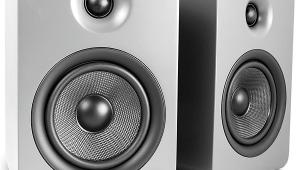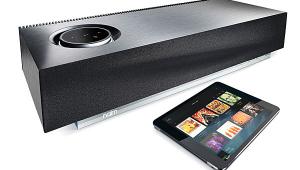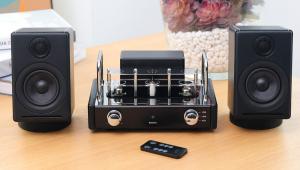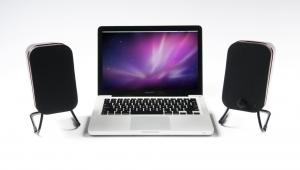Power to the Speakers: Three New Active Desktop Systems Page 4
Audyssey Media Speaker ($250/pair, audyssey.com)
Audyssey should be familiar to regular readers by the frequent appearance of its MultEQ auto-calibration/room-equalization feature, among other licensed technologies (Dynamic Volume; DSX enhanced surround) in S+V AV receiver and preamp-processor reviews. With the Media Speakers and a bevy of iOS docking designs, the USC-birthed firm has stepped beyond its comfortable licensing realm into manufacturing. (Why anyone would want to leave the genteel and profitable world of licensing intellectual property for the rough-and-tumble of selling physical stuff to actual consumers is anyone’s guess. They’re on a mission, I suppose.)
Audyssey originally dubbed this design the “Lower East Side Speakers,” part of a geographic naming scheme the firm appears to have (wisely) abandoned. By far the smallest of our three models, the Media Speakers are the only ones I would consider genuinely desktop sized by most folks’ standards.
That said, in both features and performance they compare very favorably indeed. While the Media Speaker’s compact dimensions accommodate only a 3-inch woofer, much of the rear panel is given over to a “raceway”-shaped passive-radiator: essentially, a cabinet-port variant that helps a smaller enclosure behave physically, in some ways, like a much larger one. (Another secret to the Media Speaker’s diminution is its outboard, wall-lump power supply.)
The right speaker’s rear panel proffers a 1/8th-inch stereo line input and an optical-digital input, along with a multi-pin jack for the power supply. There’s also a push-connector output for the left speaker, whose own reverse’s solitary feature is the corresponding input. Back on the right side, the front baffle includes a large push-knob that manages on/off and volume, and another conveniently located 1/8th-inch jack adjacent: plugging in a set of headphones here automatically mutes the speakers. Nice.
In a desktop setup, playing at subjectively moderate-to-solid levels, the Media Speakers, playing behind a veil, would be impossible to distinguish from “big” speakers — they’re just that impressive. Bass extends far, far beyond the 80 Hz level I’d expect from typical mini-speakers of this size, and is impressively tight and un-flabby. The lowest few notes of bass guitar/viol could sound a bit “grumblier” than they should, especially at higher volumes, but the amount and evenness of output in the 40-80 Hz octave was astonishing.
In overall balance the Media Speakers struck me as very slightly on the bright side of things, but never unpleasantly so; think instead crisp, airy, and clear. Voices, particularly male baritones, sounded honest and defined, with just a hint of narrowing or emphasis that, if much more egregious, might have qualified as the beginnings of “honk.”
As I pushed levels on the Media Speakers, bass weight (but not extension) began to fall away (a hint of the DSP compensations churning away in the silicon brain within), but at any reasonable desktop setting bass was extended, steady, and reasonably well defined. In an in-room array the Audysseys held their own surprisingly well at background and casual-listening levels, but when asked for room-filling sound fell a bit short, producing an audibly compressed sound with incipiently audible distortion and dynamic peaks — but this is an unapologetically desktop design, so no foul there.
Audyssey’s tilt-back stand is just about perfect for orienting the in-phase output lobe to the listeners ears, though taller users may find (as I did) a single CD jewel-case under the front legs a useful improvement.
The right-front’s push-on/off-and-volume knob, with an adjacent LED that changes color (red/green) to denote off and on, is perfectly intuitive — but the speaker has a bad habit of running away from the operator pressing the knob, unless he steadies the unit with his other hand. The Media Speakers have a time-out auto-off feature that shuts them down after a few minutes of inactivity, but no corresponding auto-on, which means that if you depend on computer speakers for alarms or phone ringer or such, you may be out of luck.
- Log in or register to post comments





























































